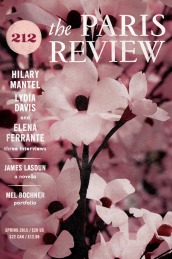
| Title | : | The Paris Review, Issue 212, Spring 2015 |
| Author | : | |
| Rating | : | |
| ISBN | : | - |
| Language | : | English |
| Format Type | : | Perfectbound |
| Number of Pages | : | 298 |
| Publication | : | First published March 1, 2015 |
New fiction by Mark Leyner, Angela Flournoy, Ken Kalfus, James Lasdun, and an essay by J. D. Daniels.
Poems by Charles Simic, Peter Gizzi, Sarah Trudgeon, Shuzo Takiguchi, Major Jackson, Craig Morgan Teicher, Susan Stewart, and Stephen Dunn. A portfolio by Mel Bochner.
The Paris Review, Issue 212, Spring 2015 Reviews
-

TPR interviews are always a delight to read and this issue was no exception. Ken Kalfus' Mercury was a standout. I was thoroughly amused reading it start to finish. On the other hand, Feathered Glory, was a disappointment, my interest was dragged by the flawed but ultimately uninteresting characters.
-

"Gone with the Mind" = 2
The Art of Fiction #226: Hilary Mantel = 4
"Feathered Glory" = 4
The Art of Fiction #227: Lydia Davis = 4
"Mercury" = 3
The Art of Fiction #229: Elena Ferrante = 4
"Lelah" = 5
Average score: 3.7, so I'm rounding it up. I really liked this issue. -

Elena Ferrante interview.
Lydia Davis interview.
Those two things make the issue. -

One of the best issues I've read so far - especially loved all three interviews, Feathered Glory by James Lasdun, and Lelah by Angela Flournoy.
-

I really enjoyed the interviews with Hilary Mantel and Elena Ferrante.
-

Mark Leyner's opening piece, "Gone with the Mind", is a funny, if slightly pretentious, monologue short story masquerading as lunatic non-fiction. My boyfriend laughed out loud a few times when he read it.
Charles Simic and Peter Gizzi's poems are OK, but nothing memorable. The interview with Hilary Mantel, however, is excellent (as expected.) Didn't realise she was such a recluse, partly because of health issues, but also an obsessive. I also admire how candid she is towards previous work she doesn't deem that good.
The interviews with Lydia Davis and Elena Ferrante are also good reads. Davis is quite dry and extremely intelligent, Ferrante is a fascinating incognito - she's apparently one of the major writers at work in Italy today yet nobody knows her true identity and what she looks like!
James Lasdun's novella "Feathered Glory" is very good, though it doesn't break any grounds. It's just well written, with all the symbols hanging there for you to look at in the end. Sometimes you don't want to think too hard after leaving the museum, and that's fine.
Finally, I really loved Susan Stewart's poem "After the Mowing".
I think I need a Paris Review subscription... -

Hilary Mantel's interview was a delight, as was Ferrante's. J.D. Daniel's essay on participating in a group think conference was nothing short of learned and hilarious. Mr. Lasdun's novella--I found myself following in the margins lines such as, "Carla had this capacity for flooring one, often just as you were running out of patience with her," with, "the same cannot be said of--" Or show-stoppers like, "Victor died," with, "boo-fucking-hoo." (Admittedly this was when my patience was run quite dry.) Stuffed with stuffy dialogue and unstuffed characters, seemingly only spun for long drawling riffs on the psychologies of said rag dolls, I was deeply saddened such a piece was granted a full 68 pages of le cahier de Paris. A fine edition to read in the lavatory, you may find it's uses manifold.
-

Took me an inordinate amount of time to finish this simply because there was nothing to hold my interest. More boring prosaic unimaginative short stories seemingly taken from a short stories for dummies tutorial. Usually I'm at least interested in the interviews but I found that maybe I just didn't want to see this side of Mantel and Ferrante (though in truth I am generally puzzled by the whole cult of Ferrante.)
-

Really enjoyed the interviews with Lydia Davis and Elena Ferrante—the latter made me feel even guiltier than I already did about giving up on My Brilliant Friend. I'll have to give it another shot. I also liked James Lasdun's novella. The shifting perspectives seemed trite to me at first, but I came to realize that they're actually what make the story work as well as it does.
-

Not one of the better issues. The Hilary Mantel interview was revealing and threw new light on her work. Other than that piece I wasn't particularly interested in the rest of the contents. Still that's the fun of the Paris Review - one issue can be brilliant and the next decidedly lacklustre.
-

I reviewed James Lasdun's novella, "Feathered Glory" at
allthenovellas.com. -

Meh
-

First half or so of this issue was good, second half not so much
-

Can't really pinpoint why, except for the fact both Sarah's and Richard's thoughts resonated with me, but I was very impressed with James Lasdun's "Feathered Glory".
-

So-so. I really like the interviews, though.
-

mark leyner's short story "gone with the mind" is changing everything for me. I can't stop thinking of it. I'm stealing his imaginary intern. the primordial horde is a trippy ass bit too







